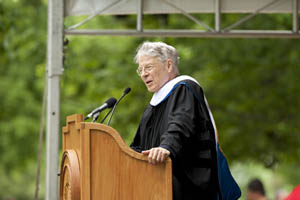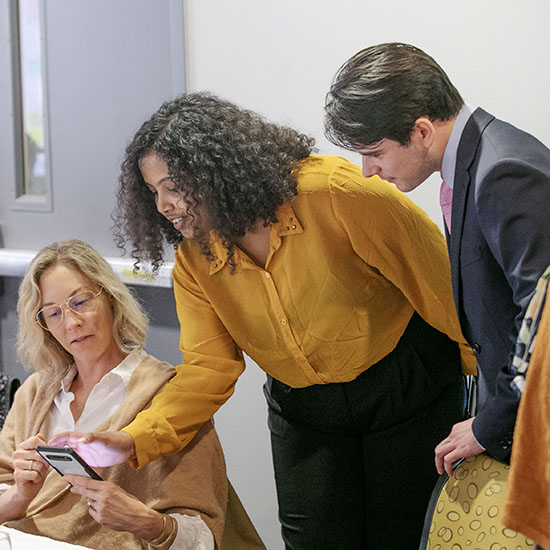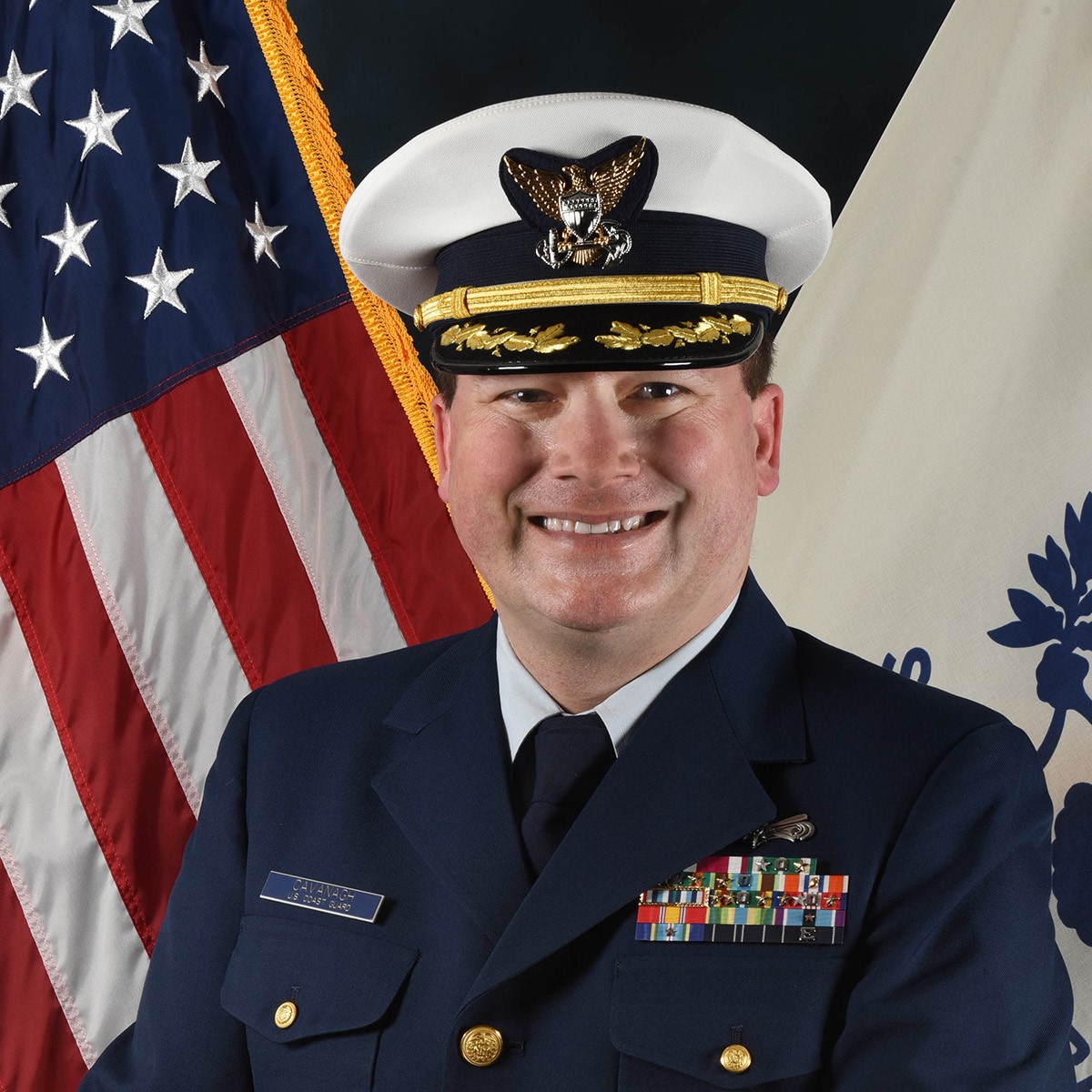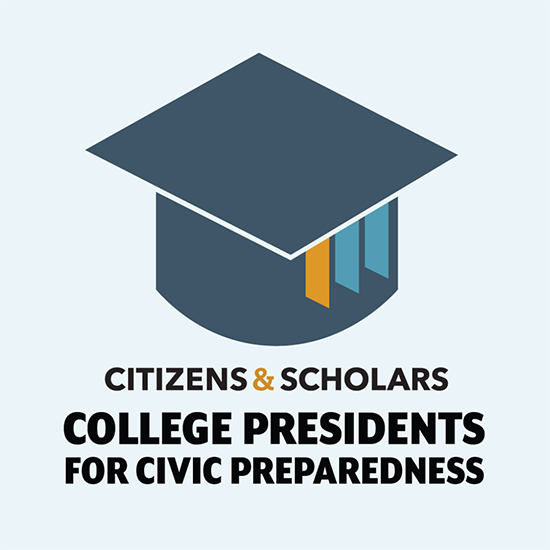David Porter honored by Carleton College
Carleton College paid tribute to David Porter on Saturday, awarding him an honorary degree at its 137 th commencement.
Porter taught classics and music and was active in faculty governance for 25 years at Carleton, and served as president for his last year there, 1986-87. That same year hewas named Skidmore's fifth president, a role in which he served from 1987 to 1999. Now into the third year of a five-year appointment as the Tisch Family Distinguished Professor at Skidmore, he teaches in the classics and English departments and continues to be active as a pianist.

David Porter at Carleton College
(Photo by John Noltner/Carleton College)
Below is the complete text of his commencement remarks, titled "Play, Seriously."
First, President Steve Poskanzer, I'd like to add my congratulations to those of so many others on what I understand has been an extraordinary first year.
And thank you, Jackson Bryce, for that generous citation. As for the puns, I've left those behind - I've already spent enough time in the pun-itentiary. As for what you said about me, I scarcely recognized myself at times, but your eloquence was worth the Bryce of admission.
This honor means more to me than I can say, coming as it does from a place so rich
in memories, a place where my late wife Laudie and I spent twenty-four good years;
where our four children loved bringing home snakes and other critters from the Arb;
and where my second wife Helen was for some ten years secretary to the president -
and taught me most of what I know about that job during that year when I worked for
her.
Congratulations to the Class of 2011 - I'm honored to receive my degree in your company,
though I'm aware you've done it four years, while it's taken me forty-nine.
Over that near half-century I've always cherished Carleton's spirit of play. At what other college do students turn ceremonial processions like today's into bubble
paths? And think of the Schiller schtick and its strict regimen of bust practices!
(I'll let you imagine the more risque versions of that line that I discarded.)
Play and serious endeavor may seem antithetical - in fact they are complementary.
Mathematician Henri Poincar writes of working at his desk for weeks on a complex
problem, making incremental progress but no more - and of three moments when breakthroughs
did occur: once as he was stepping onto a tram, once as he was walking on the beach,
and once upon waking out of a troubled sleep in the middle of the night. At none of these times was he consciously working on the problem - but his mind was
tossing it around, coming at it from different angles - playing with it?the complement and catalyst to all that rigorous work at his desk. Willa
Cather once said that essential to writing her novels was finding "the solitude to
play with an idea."
I rediscovered the importance of play early in my Carleton years. A major assignment when I arrived in 1962 was to create a new course on classical
myth. I'd never taught before, I'd last studied myth in the fifth grade, and here
I was lecturing to seventy-two students. Not surprisingly, my focus that year for both the students and myself was on getting
the myths right. We may have done that, but I certainly got the course wrong: twelve students wisely fled during drop-add; sixty slogged on but took revenge by
warning friends off the course. Enrollment plummeted the second year to twenty-four, a pattern that projected out
to a cozy eight the next. In desperation one day I suggested that students might enjoy writing their own versions
of a Greek myth. To my delight, half the class took me up on the offer - after all, they were Carleton
students. Not all the results were brilliant, but in every case the student had played with his or her myth, had gotten inside it; instead of "getting the myth right,"
each had risked getting it wrong and had made it their own. Novelist Cesare Pavese describes the process this way, whether with myth - or anything
else: "The surest, and the quickest, way to arouse the sense of wonder is to stare,
unafraid, at a single object. Suddenly - miraculously - it will look like something we have never seen before"
(the breakthrough moment!).
As a spirit of play began to infiltrate every aspect of the myth course, it too year
by year, even day by day, began to feel like something I'd never seen before - like
an ever-new and at times scary adventure. Yearly student pranks enhanced that impression: one year they cast me as the wandering Odysseus and hauled me around campus in a
red wagon, another they tied me to a large rock outside Mudd Hall as Portreus Bound,
a third they led me blindfolded through Carleton's underground tunnels - Theseus in
the labyrinth.
At the piano too my focus for myself and my students had long been on "getting it
right" - my first teacher's mantra had been, "You must be able to play it the same
way even if the chandelier falls down." Things changed when in 1966 I began learning Charles Ives' Concord Sonata, a sprawling piece permeated by Ives' playfulness: he left multiple versions of the first movement and included for the last an alternate
ending to use if a flutist happened to be available; and in the second movement he
suggests the option of fists rather than fingers for one passage and elsewhere has
the pianist play the right-hand part with a 14 inch two-by-four (when I take this
sonata on the road, I tell hosts that if they provide the room, I'll take care of my own board). The one wrong way to play the Concord is to try to get it right (even if one could), to play it the same way each time.
Instead, I realized that for it - and for other music - the goal is to know the work so well as to make each performance feel like a fresh
creation, a new journey.
Ives' father also loved musical play, and of his experiments Charles once wrote,
"Dad got some sounds as beautiful sometimes as they were funny, a complex that only
children are old enough to appreciate." It's a passage that reminds us how easy it is to lose - or to squelch - that wonder
and openness and playfulness with which we are all born - qualities which I believe
are common to all humans who make significant breakthroughs, whether in science, art,
scholarship, business, public service - you name it. Toward that end, here are my
suggestions for you, all, I think, in tune with what you take from Carleton:
- Keep alive the curiosity and laughter of the child within;
- Go beyond getting things right to seeing them afresh, as new adventures;
- Keep finding the solitude to play with ideas.
Congratulations!


